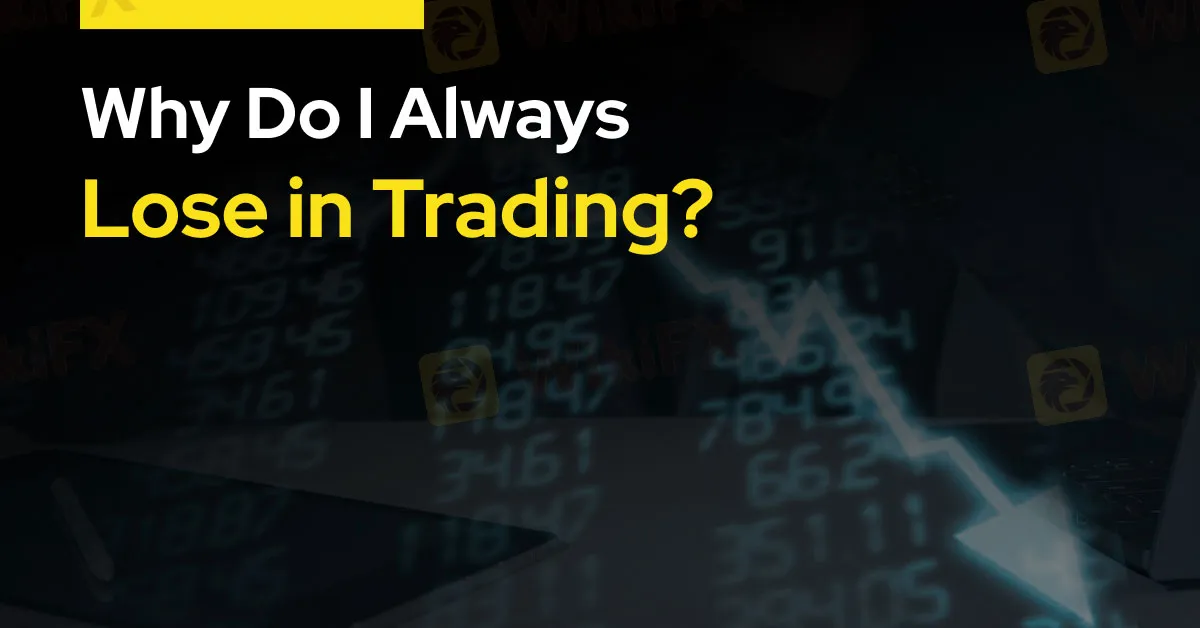简体中文
繁體中文
English
Pусский
日本語
ภาษาไทย
Tiếng Việt
Bahasa Indonesia
Español
हिन्दी
Filippiiniläinen
Français
Deutsch
Português
Türkçe
한국어
العربية
Why Do I Always Lose in Trading
Abstract:Navigating the forex and cryptocurrency markets can be a challenging journey, particularly for traders who find themselves consistently experiencing losses and grappling with the question: "Why do I always lose in trading?"

Trading in the forex and cryptocurrency markets can be both exhilarating and challenging. Many traders experience periods of losses, leading them to wonder: “Why do I always lose in trading?” While there is no single answer to this question, several factors contribute to trading losses that traders should be aware of.
One common reason for consistent trading losses is a lack of understanding of market dynamics and trading strategies. Successful trading requires a deep understanding of market trends, technical analysis, and risk management principles. Traders who fail to educate themselves adequately may make uninformed decisions, leading to losses.

Emotional trading is another significant factor that contributes to trading losses. Fear, greed, and impatience can cloud judgment and lead traders to make irrational decisions. Emotional trading often results in impulsive trades, chasing losses, or prematurely closing profitable positions, all of which can lead to losses over time.
Poor risk management is also a common culprit behind trading losses. Traders who fail to implement proper risk management techniques, such as setting stop-loss orders or properly sizing their positions, are more susceptible to significant losses. Without proper risk management, a single large loss can wipe out a trader's account.
Overtrading is another mistake that can lead to consistent losses. Some traders fall into the trap of trading too frequently, often out of a desire to recoup losses quickly or capitalize on every market movement. However, overtrading can lead to increased transaction costs, higher risk exposure, and ultimately, more losses.
Additionally, trading without a well-defined trading plan or strategy can contribute to consistent losses. A trading plan outlines specific entry and exit criteria, risk management rules, and trading goals. Traders who deviate from their trading plans or lack a clear strategy are more likely to experience losses due to inconsistency and lack of discipline.
It is important for traders to recognize that losses are an inevitable part of trading. Even the most successful traders experience losing trades from time to time. What sets successful traders apart is their ability to learn from their mistakes, adapt their strategies, and maintain discipline in the face of adversity.
In conclusion, there are several reasons why traders may consistently experience losses in trading. These include a lack of market knowledge, emotional trading, poor risk management, overtrading, and trading without a well-defined strategy. By addressing these factors and continuously improving their skills, traders can work towards becoming more consistent and successful in their trading endeavours.

Disclaimer:
The views in this article only represent the author's personal views, and do not constitute investment advice on this platform. This platform does not guarantee the accuracy, completeness and timeliness of the information in the article, and will not be liable for any loss caused by the use of or reliance on the information in the article.
Read more

Space World Capital - The Forex Broker You Should Not Partner with
Explore this guide to know the scam of Space World Capital, which does not hold a regulatory license to operate forex business.

Crypto Craze Fizzling Out? Here is Why
The Crypto Craze among users is fading out. The wave of Cryptocurrency has slowed down. But what are the major reasons why this has happened?

Social Trading Goes Mobile at M4Markets
A new mobile application for social trading has been launched through a collaboration between brokerage firm M4Markets and fintech provider Brokeree Solutions

ACY Securities Expands Crypto CFD Offering with 24/7 Trading Access
ACY Securities, a global broker specialising in CFD trading across multiple asset classes, has expanded its cryptocurrency offering by introducing 10 new digital currency CFDs and enabling 24/7 trading access across all its supported platforms
WikiFX Broker
Latest News
The Dollar Keeps Falling: How Should We View Exchange Rate Volatility?
Asia-Pacific markets mostly rise as investors parse a slew of data releases
Asia-Pacific markets rise as investors parse a slew of data releases
WikiFX Gala Night Malaysia Concludes Successfully
IG Group Unlocks Over £425 Million amid a Capital Reduction
Gold Prices Fall by INR 39,300 in the Last Week? What's Next Week's Outlook?
European stocks open slightly higher as UK-U.S. trade deal cuts autos, aviation tariffs
Treasury yields tick lower as Trump's spending bill in focus
European stocks mixed as UK-U.S. trade deal cuts autos, aviation tariffs
Ripple and SEC Drop Appeals, Bringing 5-Year Legal Saga to a Close
Currency Calculator


